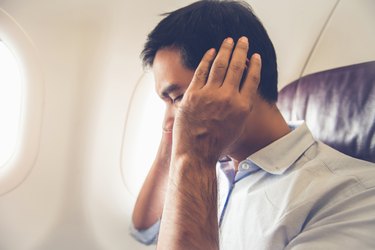
Ear popping can happen on a plane, in an elevator or while climbing a mountain. But what causes it? Barometric pressure is the likely culprit. Or rather changes in barometric pressure, which in some circumstances may also contribute to a number of serious ear-related issues.
Understanding Air Pressure
Video of the Day
Barometric pressure — or simply air pressure — refers to the weight of the atmosphere's air as it presses down on the Earth and its inhabitants, according to the U.S. National Oceanic and Atmospheric Administration (NOAA).
Video of the Day
In low barometric pressure, the air rises and exerts less force, per the NOAA. With high barometric pressure, the air sinks and exerts greater force. Low air pressure sets the stage for rainy days and clouds. High pressure lays the groundwork for sunny skies.
Air pressure is a function of altitude, with pressure dropping as altitude goes up, according to National Geographic. That's why, for instance, air pressure at the top of Mount Everest is considerably lower than air pressure at sea level.
Related Reading
Ear Popping and Air Pressure
As many people know from personal experience, low air pressure — or air pressure that's in the process of heading down as you ascend in altitude — can certainly register in your ears.
This has to do with eustachian tube function. The eustachian tube is a small tunnel that connects your middle ear to your throat, according to the American Academy of Family Physicians (AAFP). It's made up of soft tissue and muscle and ensures proper hearing by equalizing inner ear air pressure whenever it starts to rise, per the University of Texas (UT) Health Science Center.
And that, according to UT Health, is exactly what happens during an airplane's take-off or landing, when eustachian tube popping restores balance to the internal pressure around your ears.
When it works as intended, it's a non-event. But if the popping sequence doesn't play out as it should, there's real potential for ear infection or damage, including ear barotrauma.
Ear Barotrauma
"The pop one hears when pinching the nose and blowing or pinching the nose and swallowing is from the eustachian tube popping open," says Jackie L. Clark, PhD, past president of the American Academy of Audiology and a clinical professor in the School of Behavioral and Brain Sciences at the University of Texas in Dallas.
"But when our eustachian tube is not functioning properly, then our middle ear is no longer able to equalize the pressure buildup inside."
When that happens, you can experience ear barotrauma, according to Cedars-Sinai. Scuba divers, air travelers and people exposed to a large explosive blast of some kind (such as those in the military) are most vulnerable, but only if they already have a pre-existing problem with their eustachian tube.
Such problems typically stem from inflammation and fluid buildup in the tube's vicinity, per Cedars-Sinai, which can be triggered by allergies, sinus congestion, a simple cold, irritation (from cigarette smoke) or hormonal changes during pregnancy. You'd likely feel ear pressure and ear pain, but dizziness, ringing in the ear, bleeding or hearing loss may also occur, depending on the severity of the damage to the ear.
Most of the time, ear barotrauma will resolve without treatment, according to Cedars-Sinai. However, some people may need to undergo treatment with medications that can include nasal steroids, decongestants, antibiotics or pain meds. And in severe cases, you may need surgery.
People With Meniere's Disease Are at Increased Risk
People with Meniere's disease may face air pressure concerns with their ears. Meniere's is a complex disorder of the inner ear caused by fluid buildup and involving sudden attacks of severe dizziness (vertigo), ear ringing (tinnitus), ear congestion and/or hearing loss, according to the National Institute on Deafness and Other Communication Disorders (NIDCD).
Roughly 615,000 Americans currently have this disorder, per the NIDCD. These people should be aware of increases in atmospheric pressure because such changes are linked to higher chances of experiencing a telltale attack the next day, according to a small April 2016 study in PLOS One.
- Jackie L. Clark, PhD, past president, American Academy of Audiology; clinical professor, School of Behavioral and Brain Sciences, University of Texas at Dallas/Callier Center for Communication Disorders, Dallas
- U.S. National Oceanic and Atmospheric Administration (NOAA): "Parameters Measured"
- National Geographic: "Altitude"
- American Academy of Family Physicians: "Eustachian Tube Dysfunction"
- University of Texas Health Science Center: "Eustachian Tubes: Pop It Like It's Hawt"
- U.S. National Institute on Deafness and Other Communication Disorders: “Meniere's Disease”
- Cedars-Sinai: "Ear Barotrauma"
- PLOS One: "Atmospheric Pressure and Onset of Episodes of Meniere's Disease: A Repeated Measures Study"
Is this an emergency? If you are experiencing serious medical symptoms, please see the National Library of Medicine’s list of signs you need emergency medical attention or call 911.